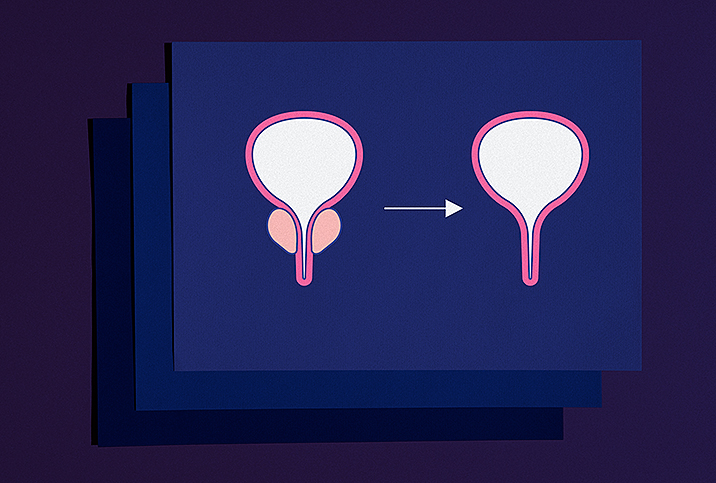Prostate Removal and Your Sex Life

For men with prostate cancer, one form of treatment may include radical prostatectomy, during which the prostate and certain surrounding tissues are removed. This surgery is most successful when the cancer is limited to just the prostate and has not yet spread to other parts of the body. Identifying prostate cancer early and having this procedure can provide a significant chance of adding 10 or more years to a patient's life.
Men who choose to undergo this treatment may have concerns about maintaining sexual function—in particular, their ability to get an erection or achieve an orgasm. Fortunately, even if you've had your prostate removed, you can still enjoy a fulfilling and intimate sex life.
Prostate cancer and treatment options
Prostate cancer is most prevalent in men who are 50 and older. One of the most common types of cancer, it is often slow-growing and confined to the prostate. Sometimes, however, this type of cancer can be more aggressive, spreading quickly to other parts of the body. Treatment for prostate cancer can include surgery, cryotherapy, radiation, chemotherapy, immunotherapy and hormone therapy. Choosing the right treatment depends on each person's individual needs, concerns and health history.
Several types of prostate surgeries involve removing the prostate and some surrounding glands:
Open. This is the more traditional approach which involves making an 8- to 10-inch incision below the belly button.
Laparoscopic. The surgeon makes smaller incisions and uses a camera to monitor the progress of the surgery.
Robot-assisted laparoscopic. This is the same as the procedure described above except that the surgeon uses robot technology to more precisely control the procedure.
Nerve-sparing. This approach aims to minimize damage to nerves near the prostate.
Each type of surgery comes with its own pros and cons. If you are considering surgical treatment, be sure to do ample research and talk with your doctor before making a decision.
Sexual functions post-prostatectomy
If you're facing a prostatectomy, it's only natural to feel anxious about how the procedure could impact your sex life, especially whether you may have to deal with erectile dysfunction (ED) or no longer be able to orgasm.
Because the prostate contains so many nerve endings, some temporary ED after the procedure is common, and that may last up to a year for most men. During this time, treatment options for erectile dysfunction include oral or injectable medications, vacuum pumps and constriction devices.
If erectile dysfunction lasts longer than one year after surgery, talk to your doctor about more permanent solutions, such as penile implants or long-term medication.
One misconception about ED is that if you can't get an erection, you won't be able to achieve an orgasm. However, orgasms can still occur regardless of the presence of an erection. After a prostate removal procedure, though, orgasms may be very different.
For men with prostates, a feeling of fullness precedes ejaculation. Because this surgery removes the seminal vesicles, or the glands responsible for producing part of semen, men without a prostate will no longer feel that fullness before an orgasm—nor will they ejaculate, but will instead experience "dry orgasms."
Although getting used to how orgasms now occur may take a little time, the experience can still be just as pleasurable as pre-surgery orgasms. Oral or manual stimulation or use of a vibrator, by yourself or with a partner, can help you reach orgasm, even without an erection.
Redefining sex
If you are dealing with mental anguish about the coming changes in your sex life, it may be worth examining your concepts of what it means to have sex.
For many men, the definition of sex includes erection, penetration and orgasm, but in reality, it doesn't have to include any of these actions. By reframing the focus of sex to be about pleasure and intimacy instead of orgasm, you may find that there is less pressure to have an erection or reach a climax. Talk to your partner about what you're going through, and that will help foster intimacy and understanding in the face of these obstacles.
Finally, if the effects on your sexual performance are causing mental health difficulties, consider reaching out to a mental health professional, such as a sex therapist or general counselor.
Life after prostate removal
From choosing the right treatment to getting used to sex after treatment, living with prostate cancer comes with many challenges.
If you're facing a radical prostatectomy, do some research and work closely with your doctor to understand how your life may change after surgery. Sex and orgasms will definitely change, and that's something you can discuss with your partner so you have the support you'll need to continue an intimate and satisfying sex life.

















